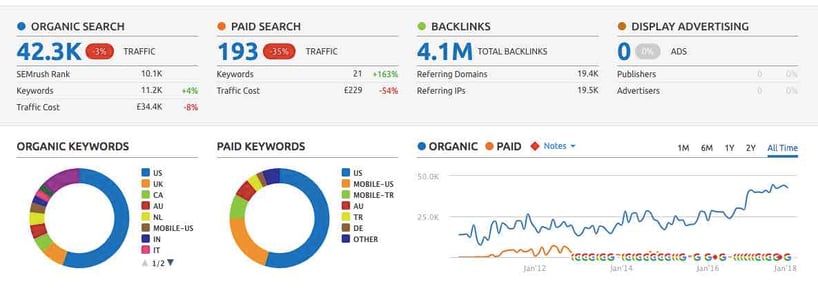In this digital marketing lead generation article, we'll outline the FIVE things you must do if you want your website to generate leads. If you follow these steps, you're guaranteed to see an improvement in the traffic and leads you get from Google™ and the other major search engines. So let's get started.

Step 1 - Know Your Ideal Customers
We've written a lot about how to create profiles of your ideal customers. In marketing speak, these are usually referred to as buyer personas but let's stick with ideal customers as it's much clearer. Your ideal customers are not everyone, this is a rookie mistake, and it's lazy; you really have to dig a little deeper, fine-tune your thinking and develop profiles of your two or three truly ideal customer types.
If it helps, go through your customer database and think carefully about the people in it. You're pretty much guaranteed to figure out that most of them can be categorised in a way that will help you understand them better.
We once had a conversation with a client who started by suggesting everyone and anyone was a potential customer. Within 5 minutes, the conversation established that, in fact, his ideal customers were male, aged between 35 and 50 and generally employed in the oil industry.
Knowing your customer intimately helps you target them more accurately, meaning your marketing budget will deliver much more value. Also, the insights you'll gain from doing this will help your business because you'll know which customers are worth the most to you. Once this has been done, you're ready for the next step.
Step 2 - Understand Your Customers Needs
With a much better idea about who your ideal customers actually are, you're sure to develop a great understanding of the problems they're trying to solve. This is worth spending some time on, but what do we mean when discussing the problems they need to solve?
For example, what problems do your ideal customers have if you sell cars? Is it as simple as needing a new car? I doubt it. The problem someone in the market for a new car is trying to solve is more likely related to affordability, economy, acceptable running costs, interest in the environment, etc. If your website says things like "we sell cars" or "buy cars from us", you're missing a trick.
The good news is because you took the time to develop ideal customer profiles, you'll find understanding the problems they want to solve straightforward. If you like, it takes the guesswork out of trying to understand how to develop the right website content.

The success of your digital marketing lead generation project depends on developing a solid understanding of the problems your ideal customers need answers for and then establishing what they're typing into Google™ when they are looking for the answers. This leads us to keyword research, so read on to find out about that.
Step 3 - Keyword Research
Keyword research is at the heart of most successful digital marketing lead gen work. The reason for this is down to the way we've all been conditioned to type words and phrases into Google when looking for information. These words and phrases people type into search engines are commonly known as keywords.
But the challenge with keyword research isn't just about establishing what people type into Google. It's about developing an understanding of both the intent and difficulty.
- Intent: What are people trying to achieve when they type in a specific search term? Are they looking to make a purchase? Are they simply looking to become more informed?
- Difficulty: Is your website going to be able to appear in a search result for a specific search, or are the sites currently appearing way stronger than yours?
Tools like SEMRush, one of our favourites, make it really easy to establish what your ideal customers are searching for, the actual words and phrases they type into Google™ and how easy or otherwise it will be for one of your pages to appear when they do. SEMRush also suggests the intent of the specific search, which is really useful.
The bottom line is you don't need to and should not guess this stuff, do the research and if you're not sure, here's a keyword research primer that will have you finding keywords like a professional in no time. I often hear people say things like, "I reckon people searching for our services type xyz into Google". Stop that right now; it's the wrong approach. Don't use guesswork; use keyword research.
Getting your web pages to appear in search results is hard, so making sure your hard work is helping you rank for the right search terms is very important. Get this wrong, and your site will be a visitor-free zone, which will only serve to help your competitors. So let's talk about your competitors and how their work can help you grow your business. Sound odd? We'll explain all.
Step 4 - Competition Research
Tools like the one mentioned above, SEMRush, make it very easy to investigate your competition. It will show you how much search engine traffic they get, what they rank for, what paid search terms they bid on, who's linking to their website, etc. I mention links because links are a vital part of search engine ranking but one of the most challenging. Here's a solid overview of the importance of link building.
An intimate knowledge of your competitors also helps you pick your fights; let me explain.
 Let's say you establish that a certain keyword would bring the right kind of visitor to your website. By investigating your competitors, you can establish how hard, or otherwise, securing that ranking might be. If you were a small retailer and the research showed you were going head-to-head with Amazon and other big brands; you might want to reconsider your approach.
Let's say you establish that a certain keyword would bring the right kind of visitor to your website. By investigating your competitors, you can establish how hard, or otherwise, securing that ranking might be. If you were a small retailer and the research showed you were going head-to-head with Amazon and other big brands; you might want to reconsider your approach.
The good news is there are still millions of search terms people use that it's possible to rank for if you develop the right strategy. Of course, it's irritating that the big players dominate the headline search terms, but usually, there are plenty of others to go around.
Also, over time tools like Google's Search Console will help you find new search terms to chase because you'll be able to see what people type into search based on your website's data.
It's really easy to quickly develop an understanding of your competitors and the market you're in. This work also feeds into the final stage in this five-part program, your content.
Step 5 - Plan Your Content Work
For some, the inconvenient truth with web-based lead generation is that it's driven by top-quality content. This is because your customers are looking for credible information when they're researching solutions to the problems they've got. A website containing nothing but a sales pitch, buy service X or product Y here, will not cut it for most businesses. It might work for Amazon, but it won't work for you.
Blogging will likely play a part in this endeavour, and although very powerful, it's much misunderstood. We've written a great overview of the purpose of a blog, so if you're floundering it will certainly help you.

Other forms of content you use might include e-books, white papers, videos and infographics. In short, your content needs to educate and inform without being overtly sales-orientated. The theory is that if you educate and help people might be seen as an authority, which could lead to engagement.
The best approach is to create a three-month content calendar, so you know what to create and when to create it. Be disciplined, follow your plan and as you get into month three, create your next three-month plan based on what's worked best in the current three-month period. If you get into the habit of creating fab content regularly, you will get more traffic and more leads from searches.
The main reason people fail at this stage is inconsistency. Typically they find other things to occupy themselves with because writing if you're not a writer, is time-consuming and lacks much in the way of instant gratification.
If you don't enjoy writing, find someone who does; otherwise, things will not go well.
So That's Your Five-Step Plan To Lead Gen
It can seem daunting when you start your digital marketing lead generation journey. There's usually a mountain to climb, and it's easy to decide not to bother. Don't be one of these people; leave being defeatist to your competitors.
In nearly every case, progress will, at first, be slow. But as you start to see the first website traffic and then enquiries start to grow, you'll know you've done the right thing.
Also, and this is so important, creating a body of work, a comprehensive blog, for example, is hard to copy. It builds a moat around your business that other businesses struggle to cross.
Get in touch if you need help building a moat around your business.

